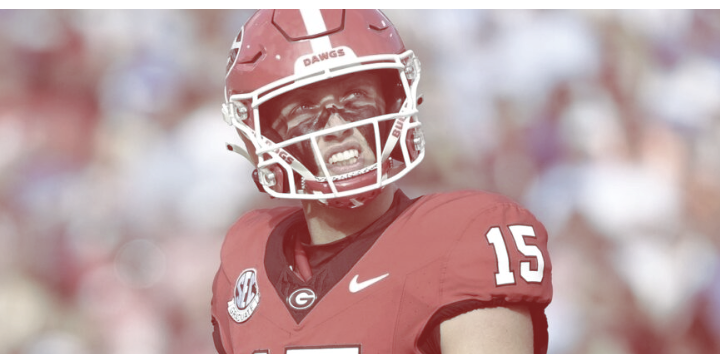At this moment, it’s clear that Carson Beck, the Georgia quarterback for 2024, is prone to making mistakes.
He has not met the lofty preseason All-America expectations, and discussions about him being the top pick in the 2025 NFL Draft have diminished. However, for the Bulldogs, these concerns are secondary compared to a more pressing question: Can Beck, despite his tendency for errors, guide UGA to its third national championship in four years?
It’s important to note that UGA can’t win a championship with Beck throwing three interceptions per game. While the team managed to win during a stretch where this occurred (notably, Beck became only the fourth FBS quarterback in two decades to achieve this dubious milestone), it raises concerns about whether he can perform under pressure. He might throw three interceptions again against a tough Ole Miss defense, but Georgia could still come out on top. This wouldn’t be astonishing, particularly given Ole Miss’s strong defensive stats this season.
However, the critical question is: how many mistakes can Beck afford to make while still leading UGA to a national championship? This situation is unlike measuring how much to drink on a Saturday night before a family brunch; winning a championship is not a simple pass/fail scenario, especially with the new 12-team playoff format that demands several victories against top-tier teams.
It’s crucial to keep this context in mind, especially since we lack historical comparisons within the 12-team playoff landscape. There is now more leniency regarding in-game errors.
For reference, here’s a look at the interception rates of quarterbacks who won national championships in the playoff era—offering a perspective on quarterbacks like Cardale Jones and Tua Tagovailoa who were not full-time starters during their titles:
– 2014 Cardale Jones: 39.5 attempts per INT
– 2015 Jake Coker: 49.1 attempts per INT
– 2016 Deshaun Watson: 34.1 attempts per INT
– 2017 Tua Tagovailoa: 38.5 attempts per INT
– 2018 Trevor Lawrence: 99.3 attempts per INT
– 2019 Joe Burrow: 87.8 attempts per INT
– 2020 Mac Jones: 100.5 attempts per INT
– 2021 Stetson Bennett IV: 41 attempts per INT
– 2022 Stetson Bennett IV: 64.9 attempts per INT
– 2023 JJ McCarthy: 83 attempts per INT
Interestingly, the two most effective national champions at avoiding interceptions are currently disappointing for the Jaguars—a topic for another discussion.
Beck’s rate stands at one interception for every 26.4 attempts, comparable to 2016 Watson (34.1) and 2021 Bennett (41). However, context matters. Watson had a record 17 interceptions that year—the most for a championship-winning QB since 1998—but his overall performance was stellar, finishing as a Heisman runner-up with 50 total touchdowns. His mistakes were overshadowed by his significant contributions to the team, including a late-season shift where he became a more dynamic rushing threat.
Unlike Watson, Beck has fewer completed games this season. We have seen examples of quarterbacks like Chris Leak, who threw 13 interceptions while sharing time with Tim Tebow, but UGA lacks a similar option if Beck struggles.
Kirby Smart expresses steadfast confidence in Beck, noting his ability to respond to mistakes during games. The concern is determining when Beck’s errors become too detrimental for UGA to overcome. Even when facing Alabama, Beck’s mistakes didn’t ultimately lead to defeat, as he managed to rally and take the lead after being down 30-7.
The last national championship-winning quarterback with a significant interception rate was Matt Mauck of LSU in 2003, who had an interception every 25.6 attempts. LSU had a formidable defense and a strong rushing game, whereas Georgia currently sits in the middle of the pack in those areas.
Georgia needs more consistency from Beck than LSU required from Mauck. This isn’t a slight against Mauck, but the demands of the game have evolved. Beck attempts more passes per game than Mauck did, indicating a higher expectation for production.
In Smart’s tenure at Georgia, his teams typically maintained a higher number of rushing attempts than passing. Yet this season, Beck is leading a passing-heavy strategy that has not yet proved effective. With injuries affecting their rushing game, it is pertinent to note that Beck was expected to be a key strength, a role he hasn’t fully fulfilled. If he does not rise to that expectation, he might not replicate Watson’s path to a championship.
The team could likely still win a title if Beck throws one interception per game, as proven by victories against Texas and Florida. However, those wins were in part due to stellar defensive performances and favorable circumstances, not solely because of Beck’s contributions.
This dynamic must shift for Georgia to succeed. Improvement for Beck involves more than just executing late drives or making smart in-game adjustments.
If he wishes to remain part of a national championship contender while still being mistake-prone, his positive plays need to be Heisman-worthy, or the defense must significantly elevate its performance (it’s surprising that Georgia ranks only 29th in stop rate). Without such results, navigating through the competitive playoff scenario will be nearly impossible.
Ultimately, even if Georgia manages to address these aspects, they could still fall short if Beck cannot deliver under pressure in the playoff rounds. The path might be set for advancing to the playoffs, but emerging victorious is a greater challenge. If adjustments aren’t made, Beck could be what stands in the way of Georgia’s championship aspirations.
At this stage, refusing to acknowledge this reality is as reckless as attempting a risky throw into triple coverage.
